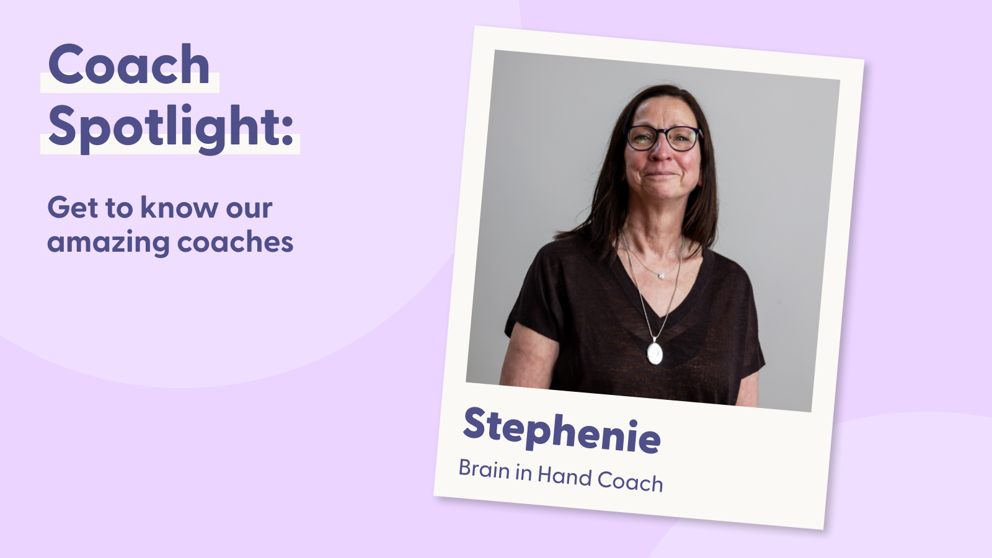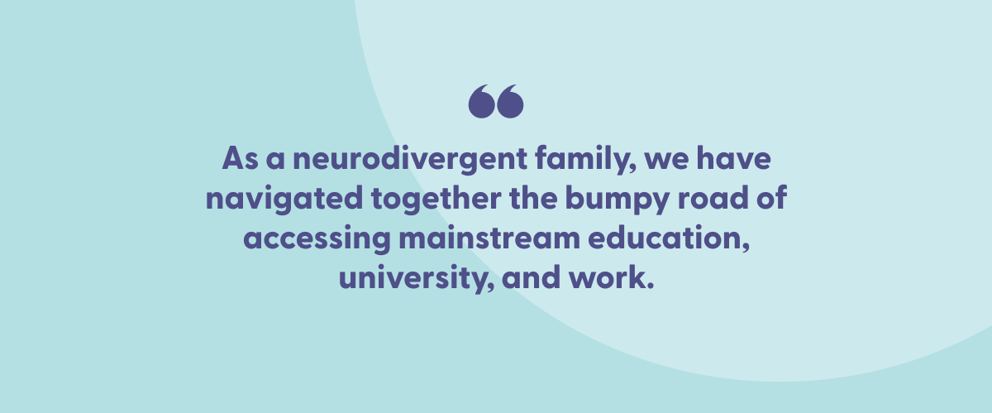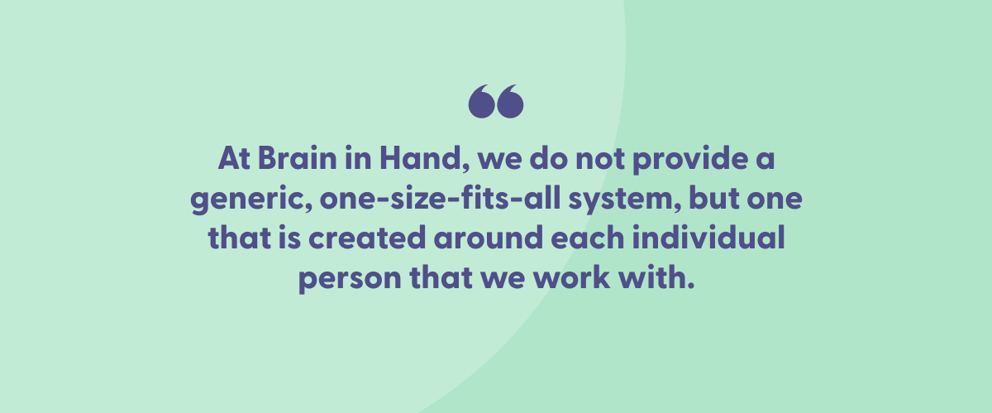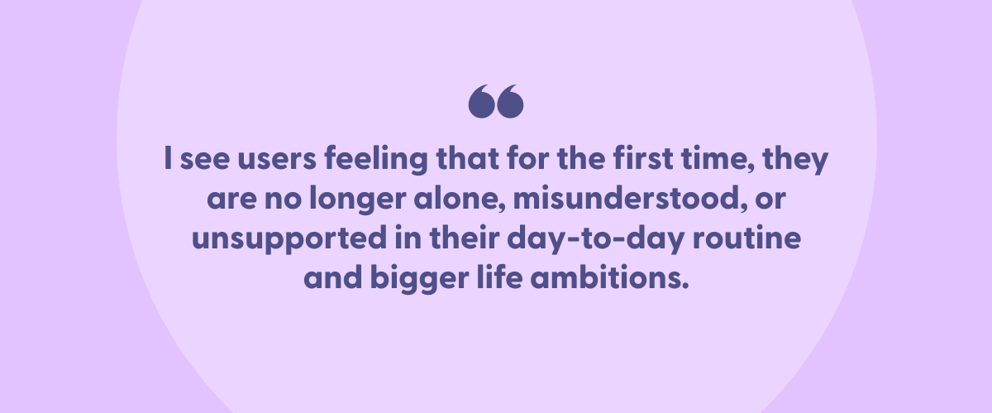Brain in Hand Coach Spotlight: Meet Stephenie

Can you introduce yourself?
Hi, my name is Stephenie Burke. I have been working as a coach at Brain in Hand since July 2021. I have raised my four neurodivergent children, all now adults, supporting them with their diagnoses of Autism, ADHD, AuDHD, EUPD, Ehlers-Danlos syndrome, and mental health difficulties.
I was also diagnosed as having Autism, ADHD, and Ehlers-Danlos syndrome in my 50s which was the beginning of my curiosity and passion for working as a lived experience practitioner.
As a neurodivergent family, we have navigated together the bumpy road of accessing mainstream education, university, and work to achieve our personal goals. Along the way, we have become very familiar with negotiating child and adolescent mental health services, SENCO’s education and health care plans, and later, adult mental health services and applications for Disabled Students Allowance and Access to Work.
Why did you become a Brain in Hand coach?
I have been working with neurodivergent adults since 2016 when I was employed by the National Autistic Society as a specialist autism mentor supporting autistic students at university. I was introduced to Brain in Hand through this work and saw firsthand how much it helped the students I worked with to achieve their goals.
In my time working in this sector, I have witnessed what a huge difference good quality coaching can bring to the people that I have worked with, seeing them achieve their desired outcomes in studies, work, and their personal lives, and the surge in confidence that comes with this. This is hugely rewarding to me after our experience as a neurodivergent family who struggled to access good support.
I am passionate about widening inclusion to as many people as possible, which was why I came to work with Brain in Hand, where I can bring the benefits of coaching to people from all walks of life, not just those at university. I have a huge love of learning and at Brain in Hand, I am given plenty of opportunities to update my knowledge and experience to deliver coaching that is tailored to the individual wants and needs of every person that I work with.

What's your professional background?
As a qualified nurse in my 20s, I worked at the Royal Marsden in London on a unit treating young adults with Leukaemia, then in Accident and Emergency in Surrey. In both roles, I gained a lot of experience in supporting people one-on-one empathetically as we worked through some very difficult experiences.
While I brought up my family, I studied a BA and MA in literature at the Open University, an experience which has been beneficial in my work with students. When my son was diagnosed as autistic and was struggling in education, I studied for the Post Grad Diploma in Autism at Sheffield Hallam University to learn as much as I could to support him.
I have recently studied for and passed my levels 2 and 3 counselling skills with the CPCAB which has been influential in my provision of a supportive, understanding, listening environment for the people that I coach with Brain in Hand.
How do your lived experiences and expertise help you as a coach?
Through my lived experience as a parent of four neurodivergent young people, I have negotiated the mainstream education system including contact with SENCO’s Educational Psychologists, CAMHS, and the process of obtaining EHCPs.
This included supporting adolescents and young adults with mental health difficulties as we experienced the support and therapies provided by the NHS. I supported them through applying for DSA and obtaining adjustments and support as they went to university. Recently, we have also made Access to Work applications which has been insightful for my work.
As a neurodivergent student and employee myself, I understand the challenge that attending university and working full time can bring, but also aim to find and promote positivity and growth in overcoming my personal challenges and those of the people that I coach.

What is your coaching process?
At the core of my coaching is the development of a safe, comfortable, and trusting coach and coachee relationship. I aim for the coachee to feel relaxed and at ease in our sessions and that they are listened to, heard, and understood.
Every working relationship that I provide with each coachee is different. I tailor my coaching around the individual wants, needs, and goals of each person that I work with.
In a climate where the right support can be difficult to find, or is only provided in the short term, I am always proud to inform each new coachee that I am here to provide continuous and consistent support while they are using Brain in hand, and that this can follow them through the many different chapters in their lives, education, work, health and social care.
What are the benefits of personalised coaching?
I am proud of the fact that through our coaching support at Brain in Hand, we do not provide a generic, one-size-fits-all system, but one that is created around each individual person that we work with.
The personalised support that we provide means that through our evolving relationship with the people we coach, we get to know what is important to them, help them identify strengths and difficulties, and create achievable goals that we work on together.
As a solution-focused system, we work closely with each coachee to prioritise what it is they want to work on, helping to break this down into short-term steps which we can return to when we meet for a catch-up in each review.
What advice would you give to someone who might consider Brain in Hand coaching?
Consistently, I see coachees feeling that for the first time, they are no longer alone, misunderstood, or unsupported in their day-to-day routine and bigger life ambitions.
With Brain in Hand, alongside their continuous coaching, they also have access to 24/7 on-demand support via the app for times they are experiencing difficulties. Together, we build into the app the strategies that will help them as an individual when this happens, which means the on-demand support service can access this when on a call and can also support the user tailored to their individual needs.
I am always excited to see the coaches grow in confidence as they develop growth in their self-awareness in their coaching with the realisation of their personal potential and ambition. This enhanced self-knowledge that develops over time in coaching is key to overcoming obstacles and breaking down barriers to become the person that we want to be.
I have heard words such as ‘game changer’, ‘life-changing’, ‘I wish that I had this sooner’ and ‘a joined up, wraparound comfort blanket’ which makes me satisfied that increased inclusivity is being provided by the team here at Brain in Hand.

How do you use Brain in Hand?
I'm a Brain in Hand user myself! As a neurodivergent student, employee, and Mum, I use my Brain in Hand system to remain organised, calm, productive, and efficient when juggling my different hats.
My whole life is stored in my Brain in Hand, which has significantly reduced anxiety, and overwhelm, prevented burnout, and significantly reduced my risk of experiencing a shutdown.
It has enabled me to realise my dream of being an autistic person in full-time, paid employment. This makes me one of the just 16% currently able to do this, a statistic that I hope to see improve as we bring Brain in Hand to more people in the future.